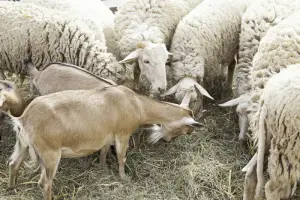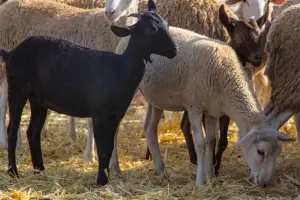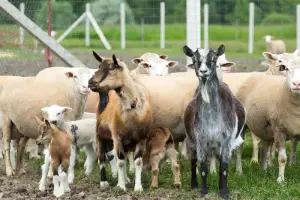Owning Goats vs. Sheep
If you are interested in bringing a herd of small livestock to your homestead, you will want to look into both sheep and goats. While these two species are both ideal livestock for dairy and meat operations, big and small, there are substantial differences in behavior, care, and profit margins depending on the business you are in.
What are the differences between goats and sheep? Goats and sheep are different in many ways. Profitability will depend on the operation, though sheep meat is often sold at a higher price, and goats usually produce more milk. Their care requirements are similar, except that sheep require shearing, and goats are harder to confine. And their behavior can differ as sheep tend to be timider, while goats are often curious.
If you are interested in learning more about the differences between these two livestock species, you will want to read on for more details about their profitability, care requirements, and behavioral differences.
Goats vs. Sheep: Profitability
If you want to make a business out of your operation, you will need to consider the profitability of goats and sheep. You can make money in a number of ways, including dairy, milk, and selling lambs/kids.
Selling Price of Goats vs Sheep
The selling price will vary greatly depending on the breed of your animal. There are a few generalities that you can take into consideration, though, such as:
- Sheep meat generally sells for a higher price than goat meat
- On average, goats can produce more young annually than sheep
- Goats typically produce more milk than sheep and have a longer period of lactation
While these are all generalities and will vary depending on the breed of animal, it can give you a good start when looking at profitability according to the operation you are looking to build.
Feed Cost of Goats vs. Sheep 
With any livestock operation, their feed will by far be the largest expense. This is where you will need to consider your land and your climate.
Sheep graze (at ground level), and goats browse (at eye level). If you have a healthy, flat pasture full of grass, you are well-equipped for sheep. If your property is full of brush, shrubs, and weeds, you may be better suited for goats. If you have neither grass nor brush in abundance, you will need to supplement your animals’ feed.
While you can theoretically feed your animals at no cost if you have the land, vegetation, and rain necessary, most operations do not have enough to sustain a herd. This is where the expense comes in – hay prices continue to increase, and your animals will need a steady supply if they are not getting their nutrients from the land.
Because sheep naturally eat grass, they can thrive on hay (dried grass). Goats will actually need higher-quality hay because their digestive tracts are not designed to live on grass alone – their digestive system works more quickly than that of a sheep’s, so they do not have as much time to absorb nutrients. Ideally, you will be feeding high-quality hay regardless of whether you are raising sheep or goats, but this is something to take into consideration.
Fencing Cost of Goats vs. Sheep
Probably the largest up-front cost you will incur for either animal will be fencing. Goats are notorious escape artists and are very agile when compared to sheep. Most sheep can be secured using 4’ panels, which goats can clear with ease. Agile goats need 6’ fencing or electric fencing added to 4’ panels. You also must take care to ensure there is nothing within a goat’s pen that they can use as a platform to jump from one side of the fence to the other.
If you are planning to have a large herd or securing a significant portion of land, the cost of fencing might make sheep a more attractive choice. While this is a one-time investment (aside from ongoing maintenance), it can be a very large expense and may take years to recoup.
Goats vs. Sheep: Care Requirements
Goats and sheep have similar care requirements – they have slightly different but comparable dietary needs, they have almost identical housing and sanitation needs, and they both need regular parasite treatments and vaccinations. They are both hardy animals, have similar breeding cycles, and produce offspring easily and with little need for help. They are both equally vulnerable to large predators and in need of protection.
Of course, being two different species, all of their needs are not identical. Aside from fencing, which we already covered, here are some of the ways in which they differ:
Grooming Requirements of Goats vs. Sheep
One obvious difference in care requirements is the need to shear wool sheep. The wool of a sheep continues to grow – if it is not sheared at least annually the wool can become so thick and long that it impacts the movement of the sheep, threatening the animal’s safety. Because sheep are typically skittish animals, this can be a challenging task but can be outsourced to a professional (at a cost, of course.)
If you are not raising sheep for their fiber and do not want to mess with shearing, there is an alternative. You can get hair sheep – these sheep have no wool at all, rather a short hair coat similar to that of a goat. Hair sheep are quite common in many regions, and some of them make excellent dairy sheep. In addition, there are sheep like the Dorper (another very common and productive sheep breed) that shed their wool naturally each Spring.
Goats, of course, need no shearing or grooming care at all other than the occasional hoof trim in certain areas, which sheep need as well.
Climate Requirements of Goats vs. Sheep
The region in which you live should also factor into your decision of which animal to bring to your homestead. Using generalities, sheep tend to do better in cooler climates, while goats tend to do better in warmer, dry climates. Both need extra care in warm and humid weather, aside from a few breeds, due to the increased parasite concern and the threat of foot rot.
Of course, being domesticated for thousands of years has allowed specialized breeds of both species to thrive in almost every part of the world. While goats generally thrive in warm, dry climates, there are several Swiss dairy breeds that are able to adapt to very cold weather.
Likewise, while most sheep do well in Northern climates, there are several breeds that have been designed to thrive in warmer regions, like the Barbados Blackbelly. There are even breeds that have proven to do well in humid, subtropical climates (like the Kiko goat). Make sure to do research into the best breeds of both sheep and goats in your local area.
Goats vs. Sheep: Behavioral Differences 
If raised from a young age, both sheep and goats can make tame, sociable livestock (or pets, for that matter).
The two species differ significantly in some behavioral categories, however, stemming from their innate dispositions.
Personality Differences in Goats vs. Sheep
In general, sheep tend to be more timid than goats, and goats tend to be more curious than sheep. Because of a sheep’s tendency toward timidity, it can be a bit more challenging to tame them. It can be harder to get them to move from one pen to another, and it can be a bit tricky when it comes to shearing, hoof care, and other close encounters.
This is why it’s important to raise a sheep from lamb hood if you want a tame, personable pet or that you adopt a sheep who has been raised in this manner by someone else.
Goats vs. Sheep: Who is the escape artist?
Goats are harder to keep secure than sheep – they are escape artists. This has to do with 1) their curious natures, 2) their habit of browsing at eye-level (and above) overgrazing, and 3) their natural agility.
As we mentioned earlier in regards to fencing, this has the potential to be an obstacle if your fencing is not already goat-proof. In general, if a sheep has a few friends and plenty of grass, he or she will be happy to stay in confinement.
Social Differences in Goats vs. Sheep
Lastly, there are minor differences in the social behavior of goats and sheep. Both are social animals and need to live with at least two to three others of their kind for their well-being. However, goats are usually more independent than sheep.
A sheep will not want to leave the protection of her flock for any reason – there is safety in numbers, and sheep have few defenses outside of their friends. Goats are more likely to leave the safety of their herd to explore their boundaries (and beyond). Again, goats are very curious and a bit less timid – this allows them to be slightly more independent than sheep.
Goats vs. Sheep: More Alike Than They Are Different
All of these differences make it seem that goats and sheep can be polar opposites – this isn’t true. Goats and sheep have many similarities and can happily live together with similar care requirements and considerations. If you do not have your heart set on one over the other, hopefully, this information has helped you in your decision. You can learn more about sheep, goats, and other farm animals in my latest content here!

